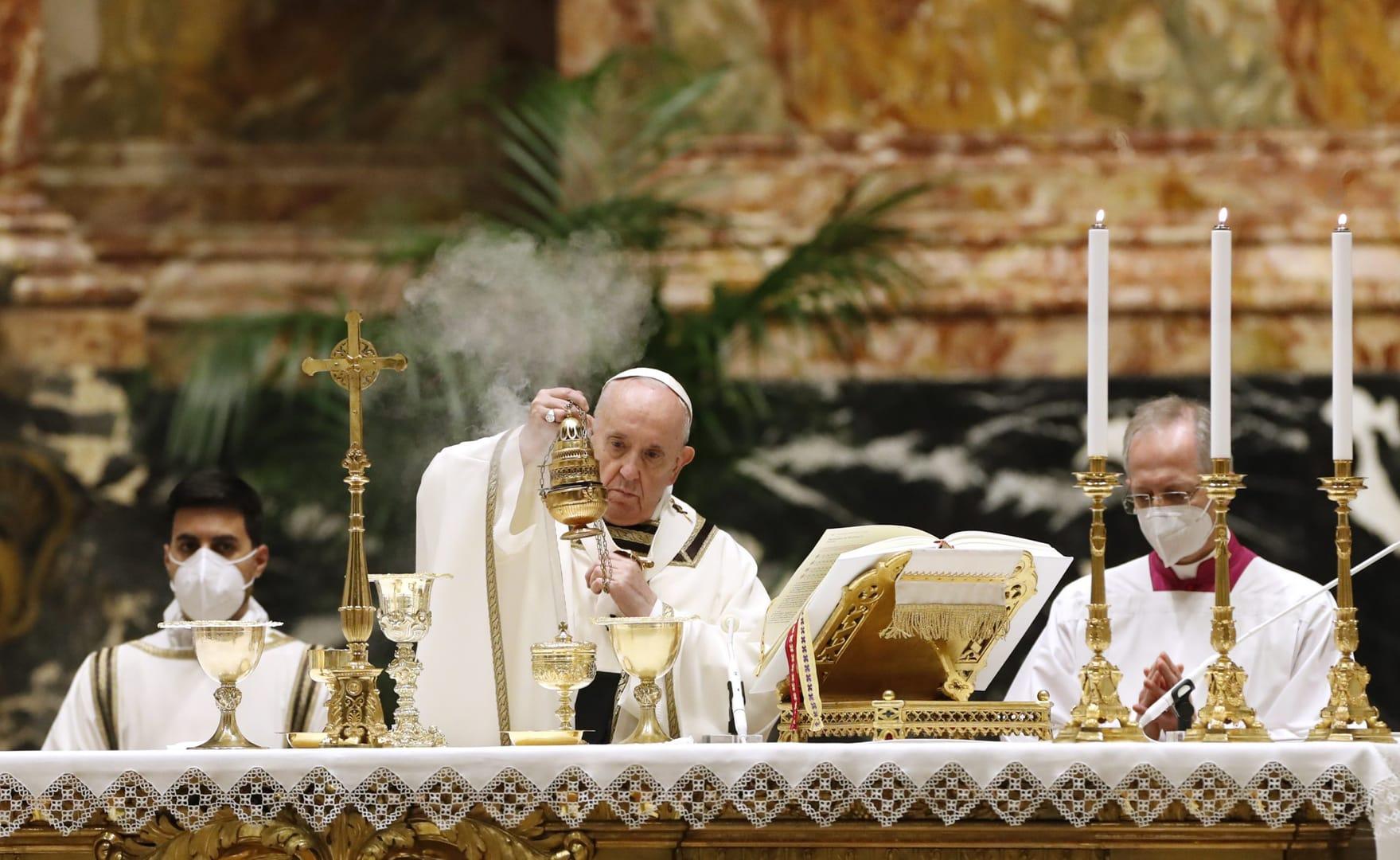ROME – Pope Francis on Easter offered consolation to all those still struggling as a result of the coronavirus pandemic, and he urged speeding up production of COVID-19 vaccines amid global delays and ensuring they reach the poorest countries.
In his Easter Urbi et Orbi address, the pope said the resurrected Christ is a sign of “hope for all who continue to suffer from the pandemic, both the sick and those who have lost a loved one.”
“Everyone, especially the most vulnerable among us, requires assistance and has the right to have access to necessary care,” he said, adding, “This is even more evident in these times when all of us are called to combat the pandemic.”
Calling vaccines “an essential tool in this fight,” Francis urged the international community “in a spirit of global responsibility, to commit to overcoming delays in the distribution of vaccines and to facilitate their distribution, especially in the poorest countries.”
Pope Francis offered his traditional Easter Urbi et Orbi blessing “to the city and to the world” after celebrating Mass Sunday morning in St. Peter’s Basilica, which was closed to the public and livestreamed due to ongoing coronavirus restrictions.
Rather than giving a homily, the pope, as he has done on occasion in the past, sat in silence for several minutes after the Gospel reading before continuing the liturgy.
In his Urbi et Orbi address, given after Mass at the entrance of the basilica, Pope Francis said the risen Christ is also a sign of hope and comfort for all those unemployed or struggling financially because of the pandemic, and asked that public authorities “act so that everyone, especially families in greatest need, will be offered the assistance needed for their decent sustenance.”
He prayed that restrictions preventing Christians from attending liturgical celebrations would soon be lifted, asking that these “as well as all restrictions on freedom of worship and religion worldwide, may be lifted and everyone be allowed to pray and praise God freely.”
Francis also prayed for the many young people who have gone months without going to school or seeing their friends in person, insisting that “Experiencing real human relationships, not just virtual relationships, is something that everyone needs, especially at an age when a person’s character and personality is being formed.”
Turning to the ongoing crisis in Myanmar, he offered a special shout-out to young people there who are “committed to supporting democracy and making their voices heard peacefully, in the knowledge that hatred can be dispelled only by love.”
As he traditionally does in his Urbi et Orbi, Pope Francis made a special appeal for countries experiencing war and violence, asking for peaceful resolutions and genuine dialogue.
The pope prayed for migrants fleeing war and extreme poverty, praying they would “never lack concrete signs of solidarity and human fraternity, a pledge of the victory of life over death that we celebrate on this day.”
He praised countries that welcome migrants such as Jordan and Lebanon, which is undergoing its own internal political and economic crisis but nonetheless has taken on hundreds of thousands of Syrians fleeing civil war.
“May the people of Lebanon, who are undergoing times of difficulty and uncertainty, experience the consolation of the Risen Lord and find support from the international community in their vocation to be a land of encounter, coexistence and pluralism,” the pope said.
Francis prayed for an end to the war in Syria, and for a peaceful resolution to other violent conflicts in the Middle East, including those ravaging Yemen and Libya.
“May all parties involved commit themselves effectively to ending conflicts and allowing war-weary peoples to live in peace and to begin the reconstruction of their respective countries,” he said.
Pointing to Jerusalem’s special status in the Middle East, Pope Francis prayed that the city could become “a place of encounter where all can see one another as brothers and sisters, and where Israelis and Palestinians will rediscover the power of dialogue for reaching a stable solution that will enable the two states to dwell side by side in peace and prosperity.”
He recalled his historic visit to Iraq last month and prayed that the country would continue to pursue peace and become a place “hospitable and welcoming” to everyone, regardless of religion or ethnicity.
Francis also prayed for countries and regions in Africa ravaged by violence, including Nigeria, Tigray, and Cabo Delgado, asking that efforts to resolve conflicts peacefully continue “in respect for human rights and the sacredness of life, through fraternal and constructive dialogue in a spirit of reconciliation and true solidarity.”
“There are still too many wars and too much violence in the world! May the Lord, who is our peace, help us to overcome the mindset of war,” he said, and asked that prisoners of war, especially those in Ukraine and Nagorno-Karabakh, would be able to safely return to their families.
Pope Francis condemned the fact that while the pandemic is still spreading and many countries continue to be burdened by crippling social and economic crises, violent conflicts continue and “military arsenals are being strengthened.”
He prayed that God would “inspire world leaders to curb the race for new weaponry” as violence continues, noting that April 4 marks the International Awareness Day against anti-personnel landmines.
“Amid the many hardships we are enduring, let us never forget that we have been healed by the wounds of Christ,” he said. “In the light of the Risen Lord, our sufferings are now transfigured. Where there was death, now there is life. Where there was mourning, now there is consolation.”
“In embracing the cross, Jesus bestowed meaning on our sufferings and now we pray that the benefits of that healing will spread throughout the world,” he said, wishing the world a happy Easter.
Follow Elise Ann Allen on Twitter: @eliseannallen














